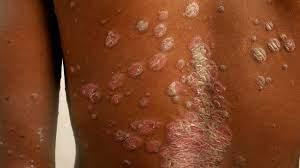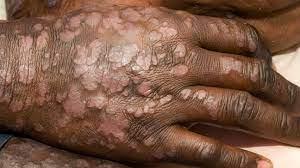Psoriasis
Although it can affect people of any age, psoriasis typically manifests between the ages of 15 and 35. It can appear suddenly or gradually, and in many cases, after it clears up, it will continue to flare up for the rest of one's life. The cause of psoriasis is not well understood. In psoriasis, skin cells are overproduced, rising prematurely to the skin's surface where they accumulate as dead cells. Your body's reaction to other diseases, such as a bacterial or viral infection, or environmental triggers, like dry air, may result in an outbreak of psoriasis. Stress, skin damage, and excessive sun exposure are all possible causes. In addition to red, discolored skin, dry, flaky scaling, joint pain, and changes to the nails, symptoms can also include irritated, itchy patches of skin. Although psoriasis can develop anywhere on the body, the elbows, knees, and scalp are the most commonly affected areas. Although it cannot be transmitted, it is believed to be an inherited disorder.
Best pronounced as "sore-eye-a-sis.". It manifests as large, scaly skin patches that on your skin. Thick and bumpy patches appear on the skin. They can be anywhere but are typically on the scalp, knees, and elbows.
Psoriasis can affect your entire body in severe cases, though it typically only affects a few areas in mild cases.
When your patches are exposed where others can see them, you might feel embarrassed.
Nobody is certain of the exact cause of psoriasis. Because the skin cells are developing more quickly than usual, your skin will become thick and red. The cells don't have enough time to shed (fall off) due to their rapid growth. Your skin develops thick, scaly patches as a result of the cells piling up on top of one another.
Psoriasis can strike anybody. Psoriasis can affect men, women, and children. There is no spread of it. Psoriasis cannot be acquired from another person. Occasionally, the illness runs in families.
A good first step is to keep your skin moisturized with some of our products. Topical medications, also known as prescription creams, ointments, and lotions, are frequently applied to the affected areas. Shampoos are used to treat scalp psoriasis. In more severe cases, pills are used to administer medication.
Unusual ultraviolet light therapy is among the other treatments. Psoriasis can benefit from sunlight. On the areas of your skin that are unaffected by psoriasis, you should wear sunscreen. Applying sunscreen to your face is particularly crucial.


